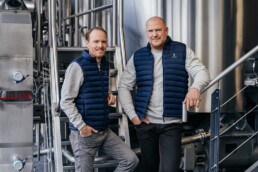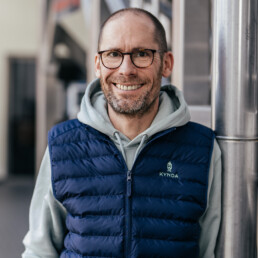Intro
We enable our customers to produce future-friendly alternative proteins in-house, using our accessible proprietary plug and play biotechnology.
We’re motivated by facilitating the future of sustainable food production. That’s why, instead of just observing from the sidelines, we’re actively developing new technology to make it faster, simpler, and more impactful.
We’re not alone in identifying the need for a better food system. As such, lots of companies are already dedicated to developing delicious and authentic meat alternatives, but with effective technology, they could go even further.
Kynda has chosen a unique path. We provide our customers with a comprehensive plug & play biotechnology system, thus empowering them to carry out in-house mycelium fermentation. This groundbreaking solution allows for greater convenience and control, unlocking a world of possibilities for sustainable culinary creations.
MYCELIUM REPRESENTS SIGNIFICANT PRODUCT, PROCESS AND COST ADVANTAGES AND IS A SUPERIOR MEAT REPLACEMENT
Mycelium product benefits
• Meat-like texture and rich umami flavour
• Clean label
• High in protein, fibre, and amino acids
• Highly versatile (can be used to replicate a variety of meats)
Process and cost benefits
• Consistent quality and security of supply
• Decentralised production, eradicating drying and transport costs
• Increased resource and price efficiency (e.g. by-product utilisation)
FERMENTATION

Fermentation is a powerhouse of potential for the alternative protein sector and has garnered itself a reputation as a ‘game-changer.’ However, many food companies face a common challenge: they lack the affordable infrastructure and expertise needed to produce mycelial proteins in-house.
That’s where Kynda has stepped up. We believe in a decentralised approach to sustainable food production and used this as the foundation for developing our plug and play biotechnology that allows our customers to easily ferment mycelium themselves, using low-cost proprietary bioreactors.
With our groundbreaking technology, we empower businesses to take charge of their own food production, making it more accessible and reliable than ever. By removing large-scale centralised systems, we create a resilient and sustainable food supply chain that benefits everyone involved.
Fermentation has traditionally been used to preserve food and extend its shelf life but this is just the tip of the iceberg in terms of what it can do. A fascinating process, fermentation has the power to transform microorganisms into food, ingredients, or commodities and it is currently experiencing an uptick in popularity thanks to its sustainable credentials.
Biomass fermentation is proving particularly promising in terms of food system overhauling. A tried-and-true methodology, it ticks vital boxes for sustainable large-scale food production, but the real value of this technology lies in its versatility and scalability as it can be carried out anywhere, offering unmatched flexibility. Moreover, it boasts a minimal environmental footprint, isn’t tied to a specific source of feedstock, and thrives regardless of weather or climate conditions. Critical issues for a world experiencing an environmental crisis.
Embracing commercial-scale fermentation technology opens the door to producing nutritious foods using abundant crops, while also utilising what would otherwise be discarded as food processing waste.
Fermentation has historically been used to extend the shelf life of food. Essentially, it involves the transformation of microorganisms into food, ingredients or commodities with specific functions. Fermentation is all the rage again, with Forbes calling it the ‚game changer‘ for alternative proteins.
One fermentation method – biomass fermentation – is a proven, versatile and scalable technology, which makes it attractive for sustainable large-scale food production. Firstly, it is a flexible technology that can be used anywhere. It also has a low environmental footprint, is not dependent on a specific feedstock source and can grow regardless of weather or climate conditions.
Commercial-scale fermentation technology offers a way to produce nutritious foods using readily available crops and by-products, and can even transform what would otherwise be discarded as food processing waste.

Plug & Play /
PLUG & PLAY FERMENTATION
Fermentation is teeming with possibilities and to unlock its full potential, bioreactors are crucial. These industrial vats or chambers create the perfect environment for microorganisms and fungi to flourish, enabling the production of sustainable proteins on a large scale. Not only does this reduce our reliance on land, but it also conserves energy and water compared to traditional agriculture.
However, we understand that building a fermentation system is a daunting endeavor. It’s a complex undertaking that frequently incurs high costs and takes time, both of which are often the result of expertise gaps and a widespread lack of affordable bioreactors.
Kynda is the solution.
We specialise in providing high-quality low-cost plug and play bioreactors, along with starter cultures and ongoing operational support. Our mission is to empower food producers to bring sustainable mycelium production in-house, effortlessly and economically.
With our solution, agri-food companies, consumer packaged goods manufacturers and biotech companies can:
- bypass bioreactor bottlenecks
- utilise their by-products;
- diversify into mycelial fermentation
- go to market quickly
- gain independence from global ingredient supply chains

Mycelium
Mycelium is an extraordinary natural organism that has captivated the minds of food scientists and sustainability experts alike. A vast network of long, microscopic fibres thriving beneath the soil, acting as the “roots” of mushrooms, it’s one of nature’s hidden treasures.
We, alongside many other forward-thinkers, firmly believe that mycelium holds the key to the future of sustainable food production. Its remarkable properties make it an exceptional alternative to meat, offering a texture and substance that rivals the conventional animal protein. And that’s not all—mycelium also offers an abundance of nutritional benefits:
- High protein levels, making it a go-to source for the essential nutrient.
- Rich in gut-healthy fibre
- Low levels of saturated fat compared to animal meat, making it better for heart health
- It contains all of the essential amino acids needed for human nutrition, making it a complete protein source
Mycelium is also a resource efficiency superstar. Working with less time and requiring a fraction of the water and energy that conventional meat does, it can also be grown without the need for extensive farmland or other scarce resources.
Kynda is fully engaged in exploring the boundless possibilities this extraordinary organism holds.
DECENTRALISED PRODUCTION
Kynda will supply its clients with ready-to-use biotechnology necessary for mycelium fermentation at industrial scale (rather than building its own central production system).
To make our bioreactors truly accessible, they have been developed with food manufacturers firmly in mind, not just scientists.
A Kynda installation will include:
- Control tools
- Cleaning and hygiene instruments
- Inoculation technology
- Remote process monitoring tools
Join us on this journey as we revolutionise the way food producers harness the power of fermentation. Together, we’ll create a sustainable, accessible, and thriving future for the food industry.

OUR TEAM
We are a multi-disciplinary and experienced team with a proven entrepreneurial track record. Our founders–Franziskus and Dan–have worked together for 9 years and have 20 years combined experience in the food industry.
CASE-STUDY: GERMAN INSTITUTE OF FOOD TECHNOLOGIES


The German Institute of Food Technologies (DIL) is a non-profit research provider with 200 employees that work in the areas of product development, process development and analytics, with a particular emphasis on sustainability and health.
Kynda has built two mobile fermentation units to enable its customers to produce mycelium in-house using low-cost plug and play bioreactors. One of those units was delivered to DIL in December 2022, for research purposes. The unit will allow DIL to produce mycelium on-site and conduct research into its potential uses in the food industry.
By working together, we can help to reduce the environmental impact of the food industry and provide consumers with increased sustainable and healthy food choices. This partnership is an example of how innovative technology can be used to address some of the biggest challenges facing the food industry today and highlights the importance of collaboration between research institutions and private companies.
OUR INVESTORS
Kynda is grateful to be backed by a superb group of VC and angel investors. Our VC investors are: FoodLabs, Sustainable Food Ventures, and Shio Capital.



According to a recent Five Seasons Ventures report, when it comes to investment, Foodtech (excluding the Food Delivery) has been the most resilient sector, behind only Real Estate. Recent analysis also points out that investing in the alternative protein segment has the highest CO2 savings per dollar of invested capital of any sector, including transportation or buildings.
If you’re a VC and want to join our revolution to create a more sustainable food system, then get in touch here.





